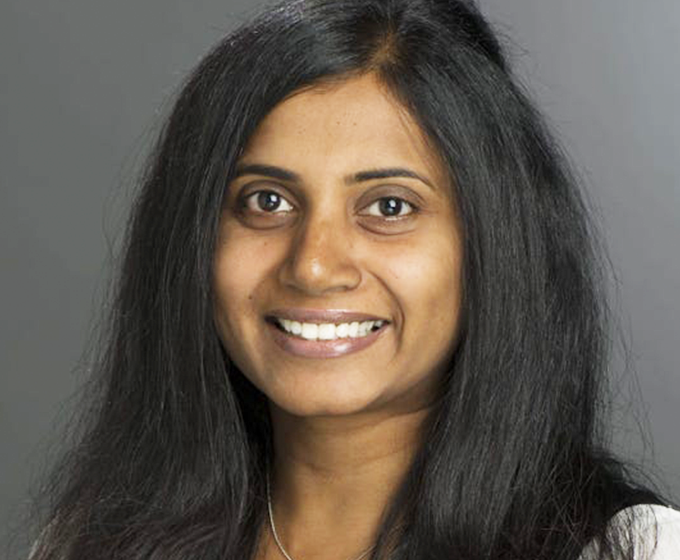
Kudithipudi was awarded nearly $1.5 million in combined funding for her research in lifelong learning.
JANUARY 6, 2021 — Dhireesha Kudithipudi, founding director of the MATRIX AI Consortium for Human Well-Being, and the Robert F. McDermott Endowed Chair in Engineering, was recently awarded $1,481,697 in combined funding for her research in lifelong learning.
This funding includes a $472,306 sub-award from Argonne National Laboratory under the Defense Advanced Research Projects Agency’s (DARPA) Lifelong Learning Machines (L2M) program, along with a $1,009,391 award from the Air Force Research Laboratory (AFRL).
These awards will fund Kudithipudi’s ongoing research developing novel brain-inspired lifelong learning algorithms and systems. Her approaches attempt to close the performance gap between modern artificial intelligence (AI) systems and biological systems, allowing them to learn new tasks while simultaneously improving their energy efficiency.
"Machine learning (ML), which is a subset of artificial intelligence (AI), allows computers to leverage large sets of data to learn how to perform specific tasks, such as recognizing objects in an image or translating languages,” explained Kudithipudi. “While current ML algorithms have achieved remarkable results, these systems are still not as intelligent as living organisms. One key limitation is their inability to adapt to new scenarios which weren’t encountered during their original training procedure. We’re attempting to close this gap by incorporating unique aspects of biological intelligence within our AI models, such as the ability to add additional processing capacity over time (neurogenesis), along with mimicking the evolutionary process within our design procedure (neuroevolution).”
In regards to the L2M project, Kudithipudi and her Ph.D. students Nicholas Soures, Tej Pandit, and Anurag Daram are collaborating with researchers from Argonne and Sandia National Labs to develop energy-efficient lifelong learning algorithms which are inspired by the honeybee brain. Although insect brains are a million times smaller, they are still capable of producing approximately half of the distinct cognitive behaviors of mammals. Replicating this efficiency is key to implementing AI algorithms on energy-constrained devices, such as mobile phones, IoT, or wearable devices.
Meanwhile, Kudithipudi’s AFRL project is focused on developing a neuromorphic chip with lifelong learning capabilities on the end device. The chip will be fabricated at the SUNY Polytechnic Institute.
“The field of neuromorphic computing, which uses inspiration from the brain to design computing systems, has been instrumental in boosting AI capabilities. There is a recent surge of activity in this area as new device technologies for neurons and synapses offer significant promise,” said Kudithipudi. “Our design will be a hybrid technology of CMOS and memristor devices, with on-device training capability. The physics of the CMOS/Memristordevice will be exploited to realize brain-inspired mechanisms, such as metaplasticity, that are critical for lifelong learning capabilities. A unique co-design flow will offer real-time learning capabilities to this system. By implementing life-long learning algorithms which mimic human cognition, the applications of AI will expand dramatically. For DoD applications, this technology will greatly enhance AI-enabled support systems which can adapt quickly in unpredictable situations.”
The MATRIX AI Consortium for Human Well-Being is focused on achieving excellence in AI research and scholarship through transdisciplinary collaboration. This current effort, which leverages innovations from neuroscience to develop novel AI systems, is an excellent example of the types of projects which the Consortium is targeting.
“To develop disruptive AI solutions, researchers must transcend traditional disciplinary boundaries. By bringing together over 60 researchers with diverse expertise from four leading institutions in the greater San Antonio area (UTSA, UT Health, Southwest Research Institute, Texas Biomedical Research Institute), MATRIX is committed to accelerating these innovative transdisciplinary collaborations,” said Bernard Arulanandam, vice president for Research, Economic Development, and Knowledge Enterprise at UTSA.
UTSA Today is produced by University Communications and Marketing, the official news source of The University of Texas at San Antonio. Send your feedback to news@utsa.edu. Keep up-to-date on UTSA news by visiting UTSA Today. Connect with UTSA online at Facebook, Twitter, Youtube and Instagram.
Move In To COLFA is strongly recommended for new students in COLFA. It gives you the chance to learn about the Student Success Center, campus resources and meet new friends!
Academic Classroom: Lecture Hall (MH 2.01.10,) McKinney Humanities BldgWe invite you to join us for Birds Up! Downtown, an exciting welcome back event designed to connect students with the different departments at the Downtown Campus. Students will have the opportunity to learn about some of the departments on campus, gain access to different resources, and collect some giveaways!
Bill Miller PlazaCome and celebrate this year's homecoming at the Downtown Campus with food, games, giveaways, music, and more. We look forward to seeing your Roadrunner Spirit!
Bill Miller PlazaThe University of Texas at San Antonio is dedicated to the advancement of knowledge through research and discovery, teaching and learning, community engagement and public service. As an institution of access and excellence, UTSA embraces multicultural traditions and serves as a center for intellectual and creative resources as well as a catalyst for socioeconomic development and the commercialization of intellectual property - for Texas, the nation and the world.
To be a premier public research university, providing access to educational excellence and preparing citizen leaders for the global environment.
We encourage an environment of dialogue and discovery, where integrity, excellence, respect, collaboration and innovation are fostered.